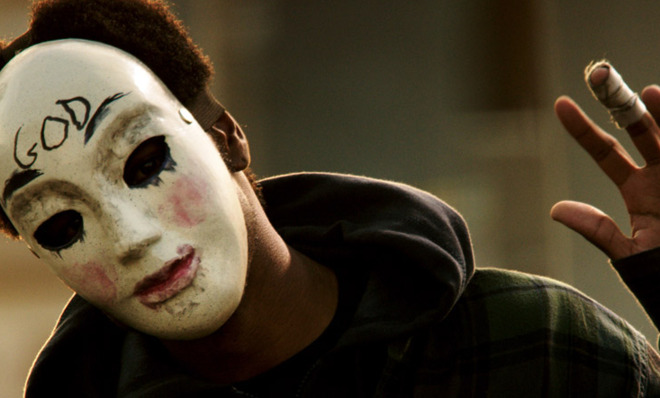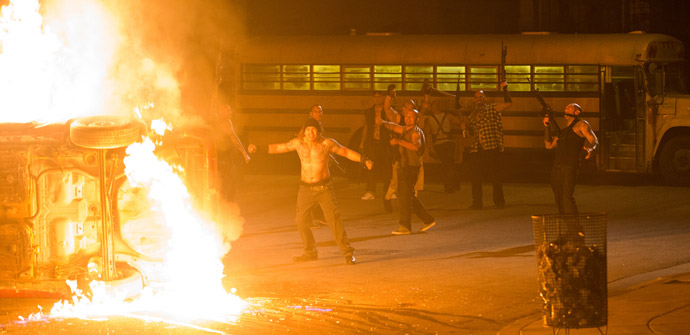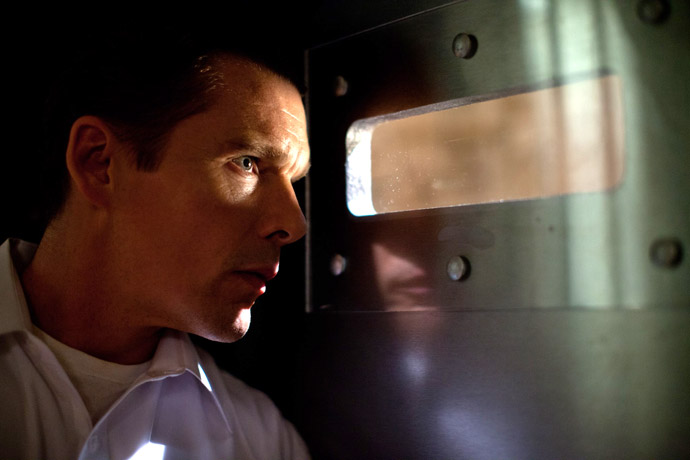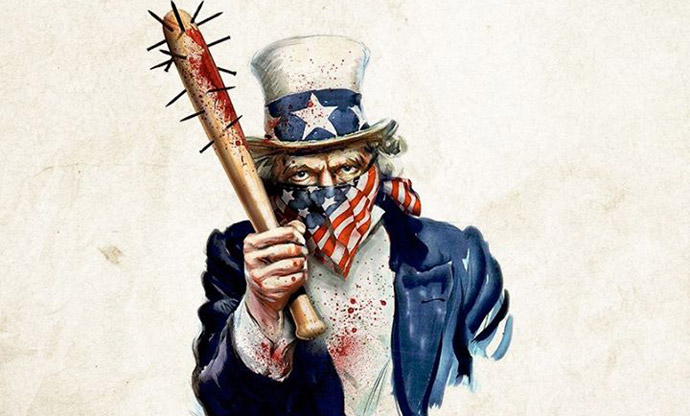What if The Purge was real?
The budding horror franchise holds a mirror up to society — but it doesn't exactly stand up to scrutiny


A free daily email with the biggest news stories of the day – and the best features from TheWeek.com
You are now subscribed
Your newsletter sign-up was successful
"The arc of the moral universe is long, but it bends toward justice." —Martin Luther King, Jr.
"We are inherently a violent species. War, genocide, murder. The denial of our true selves is the problem." —The Purge
For all the flaws of last year's surprisingly successful dystopian thriller The Purge, it did mirror reality in one significant way: just as its characters are subjected to an annual Purge, America will now be subjected to an annual installment in the Purge franchise. Tomorrow sees the release of The Purge: Anarchy, and if it's even moderately successful, it will pave the way for The Purge 3.
Both The Purge and The Purge: Anarchy take place in a near-future America in which all crime is legalized for 12 hours once a year. These are the rules, as established in a TV broadcast before the Purge begins:
1. Weapons of Class 4 and lower have been authorized for use during the Purge. All other weapons are restricted.
2. Government officials of ranking 10 have been granted immunity from the Purge and shall not be harmed.
3. Commencing at the siren, any and all crime, including murder, will be legal for 12 continuous hours.
4. Police, fire, and emergency medical services will be unavailable until tomorrow morning at 7 a.m. when the Purge concludes.
Both Purge movies are set in the early 2020s, a decision that more than anything feels like a way to avoid a CGI extravaganza and keep production costs down. But if writer/director James DeMonaco's timeline is accurate, that means we'll soon reach the point at which 88 percent of Americans are totally fine with 12 hours of legalized crime — including murder, as the government bizarrely and repeatedly emphasizes. How did it happen?
The Week
Escape your echo chamber. Get the facts behind the news, plus analysis from multiple perspectives.

Sign up for The Week's Free Newsletters
From our morning news briefing to a weekly Good News Newsletter, get the best of The Week delivered directly to your inbox.
From our morning news briefing to a weekly Good News Newsletter, get the best of The Week delivered directly to your inbox.
The Purge is annoyingly opaque about the political and social landscape of its universe, but a viral website designed to promote The Purge offers some helpful history. These are the basics: in 2014, several unspecified incidents led to "a public outcry for protection and vengeance against the increasing number of homeless." The solution, apparently, was the Purge, which was formally established by a constitutional amendment in 2019.
It probably goes without saying that this is a ridiculous idea. But as The Purge: Anarchy hits theaters — and, it should be said, explores the societal ramifications of its central event in far more detail than the original — I couldn't resist playing The Purge's game. For the sake of argument, let's go ahead and pretend that we live in a world where the Purge will be instituted within a decade. What can we expect?
Legal

Legalizing crime for 12 hours is a simple enough concept on paper — but even a cursory analysis reveals some thorny legal problems.
A free daily email with the biggest news stories of the day – and the best features from TheWeek.com
In the real world, people who announce that they plan to kill someone — like, say, a man who phones a radio talk show to declare that he will kill his boss during the Purge — can be charged with making a criminal threat. In the state of California, where The Purge is set, that can carry as much as a four-year prison sentence. Does the law also protect people from being prosecuted for crimes they threaten to commit during the Purge?
Even the rules of the Purge are fraught with complications. If all police services are unavailable until 7 a.m. the following morning, how does anyone enforce the rule about Class 4 weapons, or the prohibition on killing government officials? At the end of The Purge, Lena Headey's assailants leave her home in peace as soon as the sirens ring. But what would happen if they killed her at 7:01 a.m., when her guard was down, and before police had time to take the streets again? If you shoot someone before the Purge ends, but she dies after it ends, can you be brought up on charges because you "killed" her outside of the strictly mandated time window?
And what about crimes that aren't murder? Let's say someone enters a neighbor's home during the Purge and forces him to sign over the deeds to his house and car. When the Purge is over, are those documents legally binding? Or could the neighbor successfully sue, under normal law, to get his property back? If you parked your car in a no-parking zone during the Purge, could it be towed once the Purge was over?
In short: while the Purge was made legal by a constitutional amendment, it would essentially require an entire new branch of law (and countless hours in courtrooms across the nations) to untangle its rules from the legal standard we currently have, which is fairly unequivocal on the subject of violent crime.
Economic

The Purge takes place at a time of untold economic prosperity, with unemployment at less than 1 percent — a staggering improvement from the current unemployment rate of 6.1 percent, and a figure that's several degrees more impressive than the lowest recorded unemployment rate in American history (2.5 percent, in May and June of 1953).
How was this accomplished? It's not entirely clear. Sales of firearms, ammunition, and home-security systems are through the roof. (The family at the center of The Purge has earned its fortune, and the ire of its neighbors, by selling those elaborate home-security systems.) The collateral damage is probably enough to fuel a robust construction industry for a month or so after each Purge. The viral website offers a few more explanations for America's economic robustness: Portland, Oregon uses the remains of purged humans to power "BioMass Transit," and New York City offers housing subsidies to anyone who participates in the Purge. And given the number of people who stay home and watch the Purge on TV, airing a commercial during the Purge probably costs more than airing a commercial during the Super Bowl.
But mostly, it seems, the economy is good because a bunch of rich people kill a bunch of poor people during the Purge. The Purge sort of avoids addressing this directly, but a briefly glimpsed TV pundit argues that the Purge relies on "eliminating needy, poor, sick, non-contributing members of society" who burden the economy. Ethan Hawke's character also notes that several wealthy neighbors are "going hunting," and later encounters a homeless man running away from a bunch of preppy teenagers, who view him as "a grotesque menace to our just society."
But screamingly unsubtle political metaphors aside, that system doesn't really make sense. Consider, for example, The Purge, in which Ethan Hawke's character — a key figure in what seems to be the nation's largest home-security firm — is killed before the night is over. His death will leave a massive gap in the company's hierarchy, sending its stock price tumbling and raising serious questions about its future. And that's just one person; imagine the effect that an event this unpredictable, with such potentially dramatic consequences, would have on the U.S. economy annually.
Political

Let's talk about the New Founding Fathers — the political party that established the Purge in the first place. Where did it come from? In 2017, Congress ratified the 28th Amendment, which established "every citizen's constitutional yearly right to purge." Two years later, all political parties united under a single mantle, calling themselves the New Founding Fathers of America.
Again, The Purge's early-2020s setting renders this virtually impossible. American politics has long worked with a two-party system, and we're in the midst of one of the most politically polarized eras in decades — but somehow, within eight years, Republicans and Democrats are supposedly willing to drop all their major policy differences in favor of a plan that hinges on endorsing anarchy for 12 hours a year.
It's completely implausible that the political parties would become one under any platform, and it's even more implausible that the public would so happily go along with it. Remember, this is the near future; the vast majority of Americans that would be alive during the Purge are also alive right now, and the size of the federal government isn't exactly a non-contentious issue. Nor is the subject of the U.S. borders, which in the 2020s are open "to keep America's population robust." And while it's never been tried before, I suspect that a political platform that hinges on legalizing theft, rape, and murder would test poorly with constituents.
Moral

The core premise of The Purge implies a pretty dismal view of humankind. To accept the idea that Americans have roundly embraced the Purge, you need to accept that people need "a release for all the hatred and violence and aggression they keep up inside them." But while the subject of human nature has been debated by philosophers for years, there is no empirical evidence that Americans are broadly and secretly hungry for a night of government-sanctioned crime; as society moves forward, violent crime continues to decrease.
For whatever reason, Pew hasn't conducted a poll about whether Americans would support instituting a Purge — but I've found a few (admittedly unscientific) polls that make The Purge's 88 percent support for the concept sound ridiculous. In an open poll on debate.org, 61 percent of people said they wouldn't support a real-life Purge. In a poll on The Purge's official website, 45 percent of visitors said they "want no part" in the Purge — and those are the people who care about the movie enough to seek out a corny viral marketing page.
Let's make it even simpler: what would you do during the Purge? Psychopaths aside, does anyone feel a burning need to commit crimes on an annual basis — and if they did, is the law really the only thing that prevents them from doing it? And if morality isn't enough, think about it on a pragmatic level. Even if you wanted to commit a crime without consequences, would it be worth risking your life by wandering into the lawless streets?
In short: The Purge aims to hold a mirror up to the flaws of contemporary America — but you need to squint a lot before it actually resembles it.
Scott Meslow is the entertainment editor for TheWeek.com. He has written about film and television at publications including The Atlantic, POLITICO Magazine, and Vulture.
-
 Witkoff and Kushner tackle Ukraine, Iran in Geneva
Witkoff and Kushner tackle Ukraine, Iran in GenevaSpeed Read Steve Witkoff and Jared Kushner held negotiations aimed at securing a nuclear deal with Iran and an end to Russia’s war in Ukraine
-
 What to expect financially before getting a pet
What to expect financially before getting a petthe explainer Be responsible for both your furry friend and your wallet
-
 Pentagon spokesperson forced out as DHS’s resigns
Pentagon spokesperson forced out as DHS’s resignsSpeed Read Senior military adviser Col. David Butler was fired by Pete Hegseth and Homeland Security spokesperson Tricia McLaughlin is resigning
